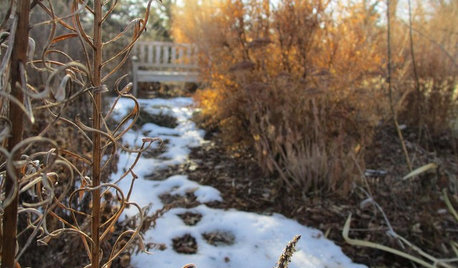Weird anti-worm post I read today
Joyousfree
9 years ago
Related Stories

GARDENING GUIDESHouzz TV: Make a Worm Bin for Rich Soil and Happy Plants
A worm-powered compost bin that can fit under a sink turns food scraps into a powerful amendment for your garden. Here’s how to make one
Full Story
DECORATING GUIDESThe Case for the Anti-Accent Wall
Go ahead, paint everything the same color (even the trim)
Full Story
DECLUTTERING10 Types of Clutter to Toss Today
Clear the decks and give the heave-ho to these unneeded items
Full Story
EVENTSOn Show: Weird, Wondrous Science Meets Design
Houses grown, not built. Power-generating soil. And snail poop that ... well, see for yourself in our coverage of a new Rotterdam exhibit
Full Story
FUN HOUZZWeird but Wonderful Backyard Features
These outdoor areas will have you looking at your own backyard through fresh eyes. Do you dare to be different?
Full Story
BATHROOM DESIGNDreaming of a Spa Tub at Home? Read This Pro Advice First
Before you float away on visions of jets and bubbles and the steamiest water around, consider these very real spa tub issues
Full Story
FUN HOUZZEverything I Need to Know About Decorating I Learned from Downton Abbey
Mind your manors with these 10 decorating tips from the PBS series, returning on January 5
Full Story
MOST POPULARThe Polite House: On ‘No Shoes’ Rules and Breaking Up With Contractors
Emily Post’s great-great-granddaughter gives us advice on no-shoes policies and how to graciously decline a contractor’s bid
Full Story
WINTER GARDENING6 Reasons I’m Not Looking Forward to Spring
Not kicking up your heels anticipating rushes of spring color and garden catalogs? You’re not alone
Full Story
FEEL-GOOD HOME12 Very Useful Things I've Learned From Designers
These simple ideas can make life at home more efficient and enjoyable
Full StoryMore Discussions






Niivek
JoyousfreeOriginal Author
Related Professionals
Maple Valley Landscape Architects & Landscape Designers · Willowick Landscape Architects & Landscape Designers · Newcastle Landscape Architects & Landscape Designers · Westwood Landscape Contractors · Long Branch Landscape Contractors · Southbury Landscape Contractors · Tehachapi Landscape Contractors · Laguna Beach Stone, Pavers & Concrete · Alamo General Contractors · Browns Mills General Contractors · Browns Mills General Contractors · Country Club Hills General Contractors · Greenville General Contractors · North New Hyde Park General Contractors · Salem General Contractorschuckiebtoo
thatgirldoesbuckets
sonshine_07
JoyousfreeOriginal Author
barbararose21101
buckstarchaser
chuckiebtoo
pskvorc
equinoxequinox
Niivek